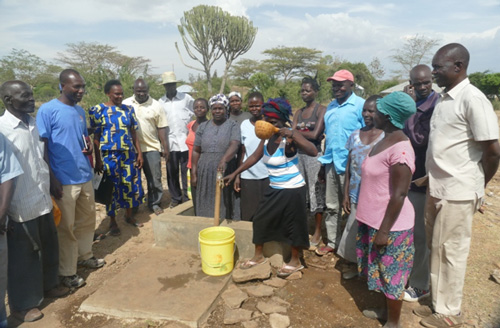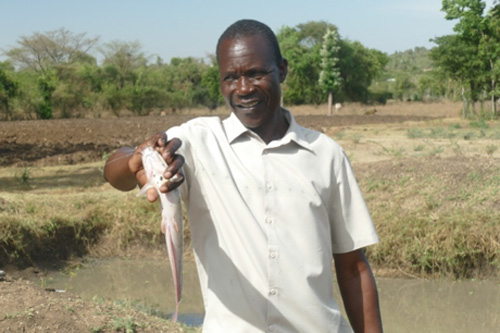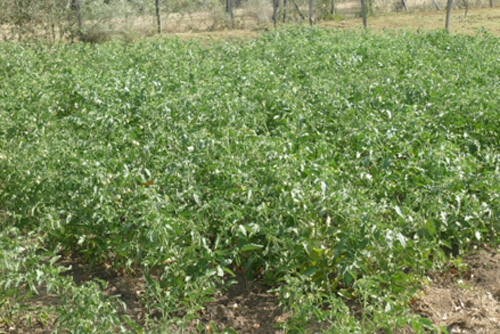Clean Water
Upon our arrival in Nairobi, by chance, we were introduced to a missionary who has been drilling wells in Kenya for 17 years. “Coincidentally” he happened to be 5 minutes away from where we were and came to visit with us. Art revealed that he can drill a well for about $15,000. Costs for the wells drilled in 2017 was about $25,000 each—a 40% cost reduction. The same day we met with a different Christian-based non-profit drilling company called Drilling for Life. The approximate cost per well is again about $15,000. Call this coincidence, but to me there was a supernatural hand in it.
We met with the Chief of West Kanyaluo. He told us that the people are very enthusiastic particularly about biosand filters and the benefits that they will have on their health. The rest of the community seems to be quickly embracing the movement. Praise God!
We met with the Regional Water Committee (RWC). It was a very good meeting with considerable enthusiasm on the part of local members. Key things discussed included primary areas of focus in 2018:
- Promotion of biosand filters for families living more than 1 km from a reliable clean water source. SOHI is providing funds for the community to make 200 biosand filters to be distributed to the neediest families (an estimated 1200 people). Our goal is for the community to run a sustainable, non-profit industry to build and distribute filters to those that need them at a reasonable cost—an initial estimate is less than $15 for a filter that will serve a large family.
- The RWC will add a focus on sanitation and hygiene as an addition to their current mission since these factors go very well with clean water. The Kendu Nurses Training School will be asked to provide training. Our goal is to train one or two teachers from each school to teach hygiene to the students—if we train the trainers, more people will be reached.
- An international Rotary grant to install a well at Adiedo Stage and a rain catchment system at Omboga Secondary School. We will hopefully be able raise funds for one or two additional new boreholes this year.
We attended a dedication and turnover ceremony for the Bondo Well that SOHI refurbished. Since it is more than 3km to the nearest well, it services many people estimated it at 1,800 people. The community is overjoyed!
The last day in the region we had a ceremony attended by the chiefs, committee members, and many community members to dedicate the new biosand filter facility and community industry. We explained the workings of the filters and actually assembled one for everyone to see. There are already many people not on the list that want to get a biosand filter as soon as possible.
Then, we delivered the first of 200 biosand filters to a family; they were so touched, excited, and appreciative—definitely a heart-warming experience.
We must remember that while great progress is being made with regard to getting clean water accessible to all the people with less than a 1km walk (each way), much work remains to be done. We estimate that we are 42% complete. Many people are still getting their water from contaminated ponds and rivers like the one below.
Education Opportunities
We met with the Regional Education Committee (REC). The meeting went well, and the members are committed to making a difference in the community. Although their challenges are great, they have a good attitude. Among many topics discussed:
- Digging water pans on school property, so grow vegetable gardens can be grown to feed the students so they will have to have at least one nutritious meal a day.
- In drought times, the schools’ greatest challenge is a lack of clean water. They have to walk many kilometers to fetch water—sometimes from ponds or rivers. This water is dangerous to drink, and many children are very ill. It is heartbreaking.
- The REC will finish compiling a Regional Public School Table similar to the one we have for clean water. This table will help the SOHI/REC Team understand where the greatest needs are.
We visited Kobila Mixed Secondary School where a Vision Trip team member had donated money to purchase bunk beds for the resident girl students that were having to sleep on the floor. The principal was very happy with the beds; as were the girls.

Economic Development
One day was spent visiting water pans around the 4 locations. In general, it is clear that many people have grasped the benefit these pans can provide to their lives (i.e., water for irrigation during the long droughts, fish farming with catfish, and even domestic water if used in conjunction with biosand filters) and are very enthusiastic. We estimate that over 80 pans are either complete or being dug at this time. That is amazing since we introduced them 1 year ago. Below, Pastor Michael holding a fish from a water pan he dug last year.
The photos below show the difference between crops that benefit from water pan irrigation and those that don’t. It’s pretty obvious why digging a water pan is worth the effort.
With water pans: CROPS THRIVE. STARVATON ENDS. EXCESS IS SOLD. THE ENGINE OF ECONOMY IS STARTED.
SOHI has initiated a pilot project to dig 80 water pans in 2018 for the neediest families. It will also help to spread the word throughout the community on the benefit of water pans; thus, helping to maintain the momentum.
We discussed other ways to stimulate the economy such as fish farming in water pans (catfish), tree nurseries, goat keeping, table-top loans. People that were previously trained in improved farming techniques committed to training their neighbors and others in the community.
The committee requested training on basic home and business economics. This would be a great benefit as most people in the community have never had “excess” funds. We are considering incorporating these topics in our September 2018 leadership training seminar.
The committee committed to accomplish the following goals in the next 6 months:
- Digging 40 new water pans (in addition to the 80 SOHI is funding)
- Expanding gardens to provide food to secondary schools
- Working with the Education Committee and schools to promote digging school water pans and planting gardens to provide food for students as well as good educational knowledge on agriculture
- Starting fruit nurseries
- Continuing to educate the community on the benefit of water pans and biosand filters.
Spiritual development
We were scheduled to meet with Pastor Michael Masambu who is an well known individual focused on helping youth to find hope and fulfillment in discovering and pursuing their God-given purpose in life. We had arranged for Pastor Michael M to meet with us and the local Regional Education and Spiritual Development committees for 2 hours. Again, we were amazed at what transpired! Instead of a 2-hour meeting, we wound up having a compelling two-day seminar covering many aspects of parenting, teaching, loving, and nurturing youth. We will continue to work with Pastor Michael on how they can incorporate the concepts into the work of the schools and churches.
The Regional Spiritual Development Committee has struggled to make progress since its inception last March. This is due in large part to the make-up of committee members. A new core committee was formed primarily comprised of pastors from SOHI’s focus area. Our objective during this trip was to encourage and challenge the newly formed committee. They have much to do in the next 6 months including working with SOHI on such activities as:
- organizing a youth seminar,
- organizing a September 2018 campaign and leadership seminar,
- working with Pastor Michael Masambu and the Educational Committee on programs to help youth.
Other Stuff
We purchased a Honda 175cc motorcycle for the team with a special contribution. This will provide a second means of daily transportation for the team that will primarily be used by Pastor Michael as he is living out in the region we serve and has had to walk or take a boda boda to get around to do his work.
SOHI’s new (used) 3-ton truck arrived from Nairobi—bought with a special contribution. It is in great shape and should provide real benefit to the work in the region. Logistics (moving things around) is a struggle in this area. Some of our current planned uses for the truck are hauling sand and gravel for biosand filter construction, delivering completed filters, hauling well pumps and repair equipment, etc.

God blessed this trip in so many ways. He was very active in miraculous ways! Please continue to pray for the amazing work He is doing in the Karachuonyo region of Kenya.










